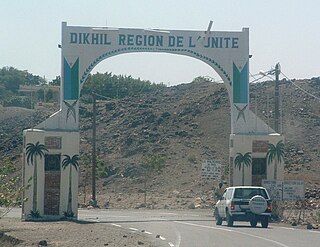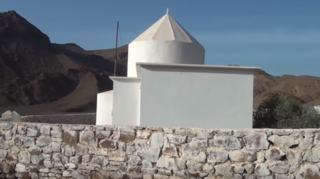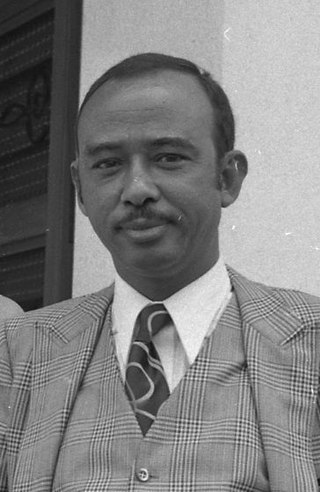Djibouti is a country in the Horn of Africa bordered by Somalia to the east, Eritrea to west and the Red Sea to the north, Ethiopia to the west and south, and the Gulf of Aden to the east.

Politics of Djibouti takes place in a framework of a presidential representative democratic republic, whereby the executive power is exercised by the President and the Government. Legislative power is vested in both the Government and the National Assembly. The party system and legislature are dominated by the socialist People's Rally for Progress. In April 2010, a new constitutional amendment was approved. The President serves as both the head of state and head of government, and is directly elected for single six-year term. Government is headed by the President, who appoints the Prime Minister and the Council of Ministers on the proposal of the latter. There is also a 65-member chamber of deputies, where representatives are popularly elected for terms of five years. Administratively, the country is divided into five regions and one city, with eleven additional sub-prefecture subdivisions. Djibouti is also part of various international organisations, including the United Nations and Arab League.

French Somaliland was a French colony in the Horn of Africa. It existed between 1884 and 1967, at which became the French Territory of the Afars and the Issas. The Republic of Djibouti is its legal successor state.

The French Territory of the Afars and the Issas was the name given to present-day Djibouti between 1967 and 1977, while it was still an overseas territory of France. The area was formerly known as French Somaliland. Its name derives from the Afar people of Djibouti and the Somali Issa clan.

Hassan Gouled Aptidon was the first President of Djibouti from 1977 to 1999.

Ahmed Dini Ahmed was a Djiboutian politician who served as the second Prime Minister of Djibouti. He was trained as a health technician and entered the political realm at age 26.

Dikhil is a town in the western Dikhil Region of Djibouti. Lying east of Lake Abbe, It is situated about 122 km (76 mi) southwest of Djibouti City and 12 km (7.5 mi) north of the border with Ethiopia. It serves as the administrative centre of the Dikhil Region, and is home to the Afar and Somali ethnic groups. The town develops gardens and fruit trees.

The Issa is a northern Somali clan, a sub-division of the Dir clan family.

The Djiboutian Civil War was a conflict in Djibouti, lasting from 1991 to 1994 and resulting in thousands of fatalities. The uneven power sharing between the Issas and the Afars led to the Civil War that ravaged the country for three years.

The Djiboutians are the native inhabitants of Djibouti, as well as the global diaspora of Djibouti. The country is mainly composed of two ethnic groups, the Somali and the Afar. It has many languages - though Somali and Afar are the most widely spoken ones, Arabic and French serve as the official languages. There is a small Djiboutian diaspora in North America, Europe, and Australia.

The Front for the Liberation of the Somali Coast was a nationalist organization, and later a guerrilla group that fought for the independence of Djibouti from France. The Front de Libération de la Côte des Somalis (FLCS) was recognized as a national liberation movement by the Organization of African Unity (OAU), which participated in its financing. FLCS was able to obtain support from Arab countries such as Algeria.
Republican Union was a political party in French Somaliland.

Mahamoud Harbi Farah was a Djiboutian politician of Somali ethnicity. A pan-Somalist, he was the Vice President of the Government Council of French Somaliland from 1957 to December 1958, during Djibouti's pre-independence period.
This is a survey of the postage stamps and postal history of Djibouti, first known as the Obock Territory; it afterwards was known as French Somaliland until being called the French Territory of Afars and Issas.
Ahmed-Idriss Moussa is a Djiboutian politician who served in the French National Assembly from 1962 to 1967. An independent, he was the main opposition candidate in the 1999 presidential election against President Ismaïl Omar Guelleh.
Omar Farah Iltireh is a politician of the French Territory of the Afars and the Issas, (TAFI) which became the Republic of Djibouti in 1977. He died in France on May 6, 2008.

Ali Aref Bourhan is a Djiboutian politician.
The Democratic Union Issa (UDI) was an anti-independence political party of French Somaliland and the French Territory of the Afars and the Issas.
The Afar Democratic Union was a political party of the French Territory of the Afars and the Issas.










